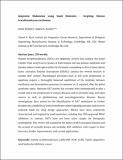| dc.contributor.author | Richters, Andre | |
| dc.contributor.author | Koehler, Angela Nicole | |
| dc.date.accessioned | 2018-11-05T19:15:35Z | |
| dc.date.available | 2018-11-05T19:15:35Z | |
| dc.date.issued | 2017-12 | |
| dc.identifier.issn | 0929-8673 | |
| dc.identifier.issn | 0000-0000 | |
| dc.identifier.uri | http://hdl.handle.net/1721.1/118890 | |
| dc.description.abstract | Histone acetyltransferases (HATs) are epigenetic drivers that catalyze the acetyl transfer from acetyl-CoA to lysines of both histone and non-histone substrates and thereby induce transcription either by chromatin remodeling or direct transcription factor activation. Histone deacetylases (HDACs) conduct the reverse reaction to counter HAT activity. Physiological processes such as cell cycle progression or apoptosis require a thoroughly balanced equilibrium of the interplay between acetylation and deacetylation processes to maintain or, if required, alter the global acetylome status. Aberrant HAT activity has recently been demonstrated to play a crucial role in the progression of various diseases such as prostate, lung, and colon cancers as well as glioblastomas and neurodegenerative diseases. Recent investigations have aimed for the identification of HAT modulators to further decipher the complexity of acetyl transferase related signaling cascades and discover potential leads for drug design approaches. HDACs have been extensively characterized and targeted by small molecules, including four FDA-approved HDAC inhibitors; in contrast, HATs have not been active targets for therapeutic development. This review will summarize the status of HAT associated diseases and the arsenal of currently known and available HAT inhibitors with respect to their discovery, further improvements, and current applications. Keywords: Histone acetyltransferases; p300/CBP; PCAF; GCN5; Tip60; epigenetics; small molecule inhibitors; cancer | en_US |
| dc.language.iso | en_US | |
| dc.publisher | Bentham Science | en_US |
| dc.relation.isversionof | https://doi.org/10.2174/0929867324666170223153115 | en_US |
| dc.rights | Creative Commons Attribution-Noncommercial-Share Alike | en_US |
| dc.rights.uri | http://creativecommons.org/licenses/by-nc-sa/4.0/ | en_US |
| dc.source | Prof. Koehler via Howard Sliver | en_US |
| dc.title | Epigenetic Modulation Using Small Molecules - Targeting Histone Acetyltransferases in Disease | en_US |
| dc.type | Article | en_US |
| dc.identifier.citation | Richters, Andre and Angela N. Koehler. “Epigenetic Modulation Using Small Molecules - Targeting Histone Acetyltransferases in Disease.” Current Medicinal Chemistry 24, 37 (December 2017): 4121-4150 © 2017 EUREKA SCIENCE | en_US |
| dc.contributor.department | Massachusetts Institute of Technology. Department of Biological Engineering | en_US |
| dc.contributor.department | Koch Institute for Integrative Cancer Research at MIT | en_US |
| dc.contributor.approver | Koehler, Angela N | en_US |
| dc.contributor.mitauthor | Richters, Andre | |
| dc.contributor.mitauthor | Koehler, Angela Nicole | |
| dc.relation.journal | Current Medicinal Chemistry | en_US |
| dc.eprint.version | Author's final manuscript | en_US |
| dc.type.uri | http://purl.org/eprint/type/JournalArticle | en_US |
| eprint.status | http://purl.org/eprint/status/PeerReviewed | en_US |
| dspace.orderedauthors | Richters, Andre; Koehler, Angela N. | en_US |
| dspace.embargo.terms | N | en_US |
| mit.license | OPEN_ACCESS_POLICY | en_US |
